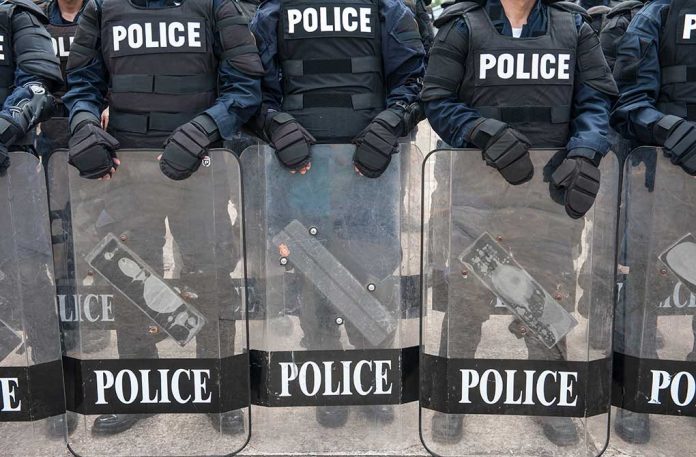
Michigan law enforcement agencies are pushing back against President Trump’s mass deportation plans, citing resource limitations and a focus on local duties.
Key Takeaways
- Michigan police departments are resisting Trump’s mass deportation strategies due to resource constraints and local priorities.
- A majority of voters support Trump’s deportation plan, especially for immigrants with criminal records.
- Grand Rapids and Lansing police departments have publicly stated they won’t participate in federal immigration enforcement.
- State agencies and educational institutions risk losing federal funding if they don’t cooperate with federal immigration policies.
- Uncertainty remains about potential sanctions against non-cooperative state officials under the Trump administration.
Michigan Police Departments Resist Federal Immigration Enforcement
President Trump’s campaign promise to implement mass deportations of undocumented immigrants is facing resistance from Michigan law enforcement agencies. Police departments across the state are citing resource limitations and a lack of interest in broad-scale immigration enforcement as reasons for their non-participation in federal initiatives.
Grand Rapids, Michigan Mayor David LaGrand says local police won’t enforce immigration law and says Trump’s deportation plan “grieves me deeply” and keeps him up at night pic.twitter.com/musBdwWLYZ
— Libs of TikTok (@libsoftiktok) February 14, 2025
Despite a survey indicating that 55% of voters support Trump’s deportation plan, with 88% in favor of deporting immigrants with criminal records, local authorities remain disinclined to align with federal efforts. This resistance highlights the complex dynamics between federal immigration policies and local law enforcement priorities.
Grand Rapids and Lansing Take a Stand
In a bold move, Grand Rapids Police Chief Eric Winstrom has publicly announced the department’s refusal to participate in Immigration and Customs Enforcement (ICE) operations. Winstrom’s stance emphasizes the separation of local and federal responsibilities in law enforcement issuing a statement, “I am confident GRPD’s policy of declining to participate in immigration enforcement with the federal government is on sound legal footing. As our policy makes clear, they have their responsibilities and we have ours.”
Similarly, the Lansing Police Department has made it clear that they consider immigration enforcement to be solely the responsibility of the federal government. This position underscores the growing divide between local and federal law enforcement priorities in Michigan.
Potential Consequences and State-level Actions
The resistance to federal immigration enforcement efforts is not without potential consequences. State agencies and educational institutions risk losing federal funding if they fail to cooperate with Trump’s immigration policies. In response to this situation, the Michigan House of Representatives has passed a resolution aimed at ensuring local policies do not hinder federal immigration enforcement efforts.
However, the effectiveness of this resolution remains to be seen, as local law enforcement agencies continue to assert their autonomy in determining policing priorities. The situation has created uncertainty about potential sanctions from the Trump administration against non-cooperative state officials.
Varied Responses Across Michigan
While Grand Rapids and Lansing have taken firm stances against participating in federal immigration enforcement, responses from other parts of the state vary. In Sanilac and Huron counties, sheriffs have expressed willingness to assist ICE but also acknowledge the importance of maintaining positive community relations.
In Ann Arbor, a recent ICE operation conducted without prior notification to local police has further highlighted the tension between federal and local law enforcement. The Ann Arbor Police Department confirmed ICE contact with a local business but emphasized their non-involvement and commitment to fair policing regardless of immigration status.
As the debate over immigration enforcement continues, Michigan’s law enforcement agencies find themselves at the intersection of federal policy and local community needs. The ongoing resistance to mass deportation strategies underscores the complex challenges facing both state and federal authorities in addressing immigration issues.
Source:
Michigan Police Defy Donald Trump’s Mass Deportation Plan



